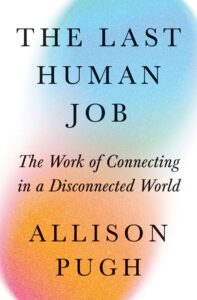Almost half of the four-year-olds in Utah are enrolled in preschool online. They watch animated videos and sing songs to learn “pre-reading,” which education administrators in the Beehive State apparently value over circle time for kindergarten success.

Allison J. Pugh describes this and other troubling trends in The Last Human Job: The Work of Connecting in a Disconnected World, published June 4 by Princeton University Press. Pugh calls on examples such as this one to demonstrate that technology and artificial intelligence are replacing humans in what she terms “connective labor.” She cautions that by diving headlong into “heedless technophilia” we are losing something essential and may not be able to get it back.
Pugh is a professor of sociology at the University of Virginia. She spent five years interviewing thousands of workers in a variety of jobs, including teachers, primary-care doctors, therapists, hairdressers, and police detectives. She uses those interviews to explore what the 21st-century economy has so far had in store for providers of support and, most distressingly, those who require that support.
Pugh defines “connective labor” as involving personal encounters based on emotion and feeling — work that requires an “emotional understanding of the other.” Skilled laborers in the caring professions work to make patients and clients feel seen. Without seeing and being seen, people don’t get healthier and smarter.
But this isn’t what big tech is selling. Data analytics might allow programmers to make machines that do “something like seeing,” Pugh writes, but they cannot actually make people feel seen “by another human being.” Cutting out people omits an essential step, but we believe the rationale that tech products are “better than nothing.”
Whatever the quality or usefulness of AI may be, it galls Pugh that the rich don’t have to accept it for themselves. In the world as Pugh describes it, the rich eat organic grass-fed steak before going to their in-person therapy appointments. Meanwhile, if they are lucky, the poor spread Jif on Stop & Shop Round Top White before they log onto their computers to check in with a bot therapist.
Tech companies say that they’ve come up with better treatments for populations that are underserved because there aren’t enough primary-care physicians or mental health providers to go around. Pugh doubts the efficacy of AI-based treatments for those suffering from diabetes, anxiety, depression, and compulsive behaviors.
Online therapy is said to work because patients don’t feel shame talking to a machine. They report that they open up to computers more easily than to humans. But over time, Pugh writes, such patients don’t fare well. She found that they stayed stuck because they hadn’t actually had to reckon with their shame. They transferred their destructive behaviors to other areas because they hadn’t been seen by and connected with a human being in a trusting relationship. Learning and change in the long term happened only in the context of relationships with skilled professionals.

Pugh compares what she found in her research to Taylorism, the supposedly scientific practices that Frederick Winslow Taylor expounded in his 1911 book The Principles of Scientific Management. In his system, based on time-and-motion studies designed to streamline output and stimulate productivity, workers had to complete tasks in a set period of time. They had no input into their involvement in work processes. They found their repetitive tasks boring.
Taylorism helped corporations make more money, but the money never made its way to the workers. Depressed wages, the destruction of skilled labor, burnout, and the decimation of unions ensued.
Pugh explores the modern-day implications of such processes in nine chapters. Her writing is clear and accessible, but her explanations are sometimes tedious. Without the kind of narrative Pulitzer Prize-winning sociologist Matthew Desmond provides in Evicted: Poverty and Profit in the American City, Pugh’s The Last Human Job may strike readers as slow going.
But like sociologist Arlie Russell Hochschild, with whom she studied at the University of California, Berkeley and whom she frequently cites, Pugh names an important phenomenon and defines it in granular detail. Hochschild coined the term “second shift,” which many readers will recognize as shorthand for gendered tasks that women perform when they get home from wage-paying work. I suspect that, years hence, readers will use Pugh’s terminology in a similar way.
Pugh brings “connective labor” to life through the stories of the people she interviewed. Sometimes, the voices of her subjects are defeated and frustrated. And sometimes, when they are allowed to use their creativity and compassion to create important bonds, workers express commitment to their jobs and delight in having time to offer support and achieve important outcomes. It’s especially good to encounter the latter.
Allison Pugh will share the stage with Boston pediatrician Barry Zuckerman in a “tent talk” about her book at the Payomet Performing Arts Center at 10 a.m. on Tuesday, July 9.
Work, Emotion, and Feeling
The event: ‘Tent Talk’ with Allison Pugh and Dr. Barry Zuckerman
The time: Tuesday, July 9, 10 a.m.
The place: Payomet Performing Arts Center, 29 Old Dewline Road, North Truro
The cost: Free; registration requested at payomet.org



